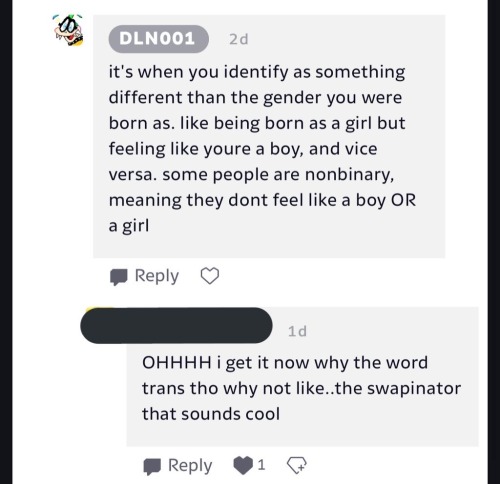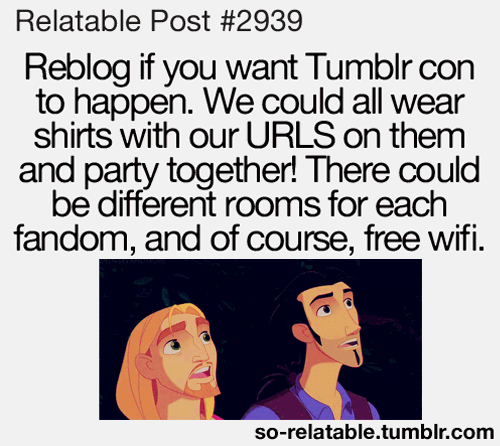What We’ve Gotta Understand Is That “the Modern Internet Is Abolishing Spaces For Adults” And “the
What we’ve gotta understand is that “the modern Internet is abolishing spaces for adults” and “the modern Internet is abolishing space for children” are compatible phenomena. Neither group is being favoured: the modern Internet is abolishing spaces for adults (i.e., because grown-up topics aren’t advertiser friendly) and the modern Internet is abolishing spaces for children (i.e., because online communities which consist principally of people who have no money are hard to sell things to). The Internet that contemporary corporate interests are trying to build isn’t a space for anyone – it’s the digital equivalent of an Ikea showroom.
More Posts from Ketxup-kid and Others


i love doodling little screampin guys because i dont actually know how to draw mouths or eyes or anatomy in general
Those "modern fairy tales where the princess saves herself" types of books not only misrepresent the gender roles in fairy tales (there are tons of stories where girls get to save the day), but they fundamentally misunderstand the entire genre.
Fairy tales aren't about saving yourself.
These aren't epic myths or heroic legends about the great warriors who slay every monster in their path because they're so awesome. Fairy tales are almost always about ordinary, even incompetent, people who get thrown into strange situations where they only succeed because of the help of others.
It's not a gendered thing. The boy who goes off to seek his fortune is usually the dim-witted third son whose older brothers are the strong, smart ones. The third son succeeds because he is kind to the magical helpers who then complete the tasks for him--and the exact same thing happens when a girl is the main character.
The characters in a fairy tale rarely succeed because they embrace their own strength and take their own path. Much more often, they are told step-by-step what to do, and they succeed because they obey--respecting the wisdom of others.
The core virtue of a fairy tale is not pride, but humility. It's not a story about the strong, but those who are weak, small, helpless. The people who can't do it all on their own, but can recognize the worth and wisdom of others.
Turning this story into a "girl power" (or even a "boy power") story warps it into something that is fundamentally the opposite of a fairy tale, and it has nothing to do with the gender of the main character.

archivist in the dashcon ball pit

and you call it madnessss ahh but i caall it looveee

Reblog if you’d attend!!

hi mechs fans long time no see









Not to be an English major, but my genuine favorite part of Malevolent is how it handles its themes. Overall Malevolent tackles such profound and interesting ideas to chew on, but it's specifically the approach it takes to those ideas that really gets me going.
For example, one of the major themes across several seasons and characters is identity. The podcast asks pretty standard questions like "How do you define yourself?" and "How do others define you?" But it doesn't choose to stop there! It constantly expands on that idea, and it also asks things like "Which of those definitions is the 'real' you?" and "Are any of them right, are any of them wrong?" and "Is there even a singular definitive version of you?"
Malevolent works out from one idea and poses all these rich lines of discussion and questioning, and then just. Doesn't provide an answer! Or, at least, not a single, one-size-fits-all answer. Instead, it gives us multiple possibilities:
John's arc tells us that your identity is what you make— what you say, what you decide— and no one else's definition of you matters. Arthur's arc tells us that you can get stuck in a rigid, self-deprecating personal identity, so you need others' perspectives to help you see and love the real "you." Larson's story tells us that you do not have the right to selectively accept/deny parts of your identity and actions, and that others can see the whole of "you" whether or not you take accountability for it. Noel's story tells us that you can choose what parts of your past define you, and that leaving behind all the other versions of yourself can be beautiful and empowering. Kayne's story tells us that leaving behind other versions of yourself is akin to murder, killing off the pieces that you don't like and pretending like you've evolved past your own self. Yellow's arc tells us that your identity is fluid and can easily be influenced or manipulated by what others tell you, and by that point you've changed your own self-definition to something entirely new that can be just as true or untrue as the old you.
With all of these characters and with every other character throughout the show, we get a unique answer to the question "What is identity?" And if you look further at all the characters, you can break down their different arcs over the seasons and find even more answers just within that one character's development and story. And some of the answers we get correspond, and some of them contradict, and none of them are the right answer, and all of them are the right answer.
Malevolent takes one idea, and then it crafts an incredibly nuanced and humanistic exploration of said idea that adapts with respect to whatever situation or character it is applied to. And it uses this approach with all of its themes: identity, morality, guilt, grief, love, hope, etc.
Malevolent knows that life is messy, that people are complicated and contradictory and diverse and ever-changing, that no part of the universe or humanity can ever be explained or defined in a simple manner. Malevolent knows all that, and it wants to help us understand that too.
Malevolent shows us that nothing can ever be easily understood or answered, and it shows us that that fact is beautiful.
THE JOURNAL. YESSS JOURNAL JOURNAL SAVED ME :)))))))). “hogs what im feeding in that there backyard”
i miss when mike walters would just stream his consciousness at me as if he was a smart man, and then fail miserably.
what happened to that?
-
 well-actually-was-taken liked this · 1 week ago
well-actually-was-taken liked this · 1 week ago -
 ichoselifecanihavearefund reblogged this · 1 week ago
ichoselifecanihavearefund reblogged this · 1 week ago -
 ichoselifecanihavearefund liked this · 1 week ago
ichoselifecanihavearefund liked this · 1 week ago -
 microwavemad reblogged this · 1 week ago
microwavemad reblogged this · 1 week ago -
 microwavemad liked this · 1 week ago
microwavemad liked this · 1 week ago -
 rarepairqueenmochi reblogged this · 1 week ago
rarepairqueenmochi reblogged this · 1 week ago -
 elronthemage liked this · 2 weeks ago
elronthemage liked this · 2 weeks ago -
 gongustheawsome01 liked this · 2 weeks ago
gongustheawsome01 liked this · 2 weeks ago -
 myxomato515 reblogged this · 2 weeks ago
myxomato515 reblogged this · 2 weeks ago -
 myxomato515 liked this · 2 weeks ago
myxomato515 liked this · 2 weeks ago -
 avgdemigod reblogged this · 2 weeks ago
avgdemigod reblogged this · 2 weeks ago -
 detlillemennesket reblogged this · 2 weeks ago
detlillemennesket reblogged this · 2 weeks ago -
 the-doodly-noodle reblogged this · 2 weeks ago
the-doodly-noodle reblogged this · 2 weeks ago -
 kowabunga-hawkbitch reblogged this · 2 weeks ago
kowabunga-hawkbitch reblogged this · 2 weeks ago -
 utopia-and-broken-cynics reblogged this · 2 weeks ago
utopia-and-broken-cynics reblogged this · 2 weeks ago -
 chelonianmobile liked this · 2 weeks ago
chelonianmobile liked this · 2 weeks ago -
 the-starry-bard reblogged this · 2 weeks ago
the-starry-bard reblogged this · 2 weeks ago -
 c-winchester67 liked this · 2 weeks ago
c-winchester67 liked this · 2 weeks ago -
 harry-so-scary reblogged this · 2 weeks ago
harry-so-scary reblogged this · 2 weeks ago -
 harry-so-scary liked this · 2 weeks ago
harry-so-scary liked this · 2 weeks ago -
 bifauxnnen liked this · 2 weeks ago
bifauxnnen liked this · 2 weeks ago -
 perspicacious-dragon-of-welkin liked this · 2 weeks ago
perspicacious-dragon-of-welkin liked this · 2 weeks ago -
 when-can-i-sleep liked this · 2 weeks ago
when-can-i-sleep liked this · 2 weeks ago -
 snovolovac reblogged this · 2 weeks ago
snovolovac reblogged this · 2 weeks ago -
 the-gayest-dovah reblogged this · 2 weeks ago
the-gayest-dovah reblogged this · 2 weeks ago -
 thatfanboycas reblogged this · 2 weeks ago
thatfanboycas reblogged this · 2 weeks ago -
 llamascanbepurple reblogged this · 2 weeks ago
llamascanbepurple reblogged this · 2 weeks ago -
 owl-noire reblogged this · 2 weeks ago
owl-noire reblogged this · 2 weeks ago -
 owl-noire liked this · 2 weeks ago
owl-noire liked this · 2 weeks ago -
 pomegraney liked this · 2 weeks ago
pomegraney liked this · 2 weeks ago -
 batsintheshadows reblogged this · 2 weeks ago
batsintheshadows reblogged this · 2 weeks ago -
 itistimeforusalltodecidewhoweare reblogged this · 2 weeks ago
itistimeforusalltodecidewhoweare reblogged this · 2 weeks ago -
 xxadorableillusionsxx liked this · 2 weeks ago
xxadorableillusionsxx liked this · 2 weeks ago -
 coolthinghere reblogged this · 2 weeks ago
coolthinghere reblogged this · 2 weeks ago -
 coffeecuphuman reblogged this · 2 weeks ago
coffeecuphuman reblogged this · 2 weeks ago -
 sailoreuterpe liked this · 2 weeks ago
sailoreuterpe liked this · 2 weeks ago -
 woobie-wan reblogged this · 2 weeks ago
woobie-wan reblogged this · 2 weeks ago -
 snenby-with-two-daggers reblogged this · 2 weeks ago
snenby-with-two-daggers reblogged this · 2 weeks ago -
 orville-redenbacher-space-hero reblogged this · 2 weeks ago
orville-redenbacher-space-hero reblogged this · 2 weeks ago -
 iamhedwig915 liked this · 2 weeks ago
iamhedwig915 liked this · 2 weeks ago -
 goatse-syndicalist-69 reblogged this · 2 weeks ago
goatse-syndicalist-69 reblogged this · 2 weeks ago -
 parttimepunner reblogged this · 2 weeks ago
parttimepunner reblogged this · 2 weeks ago -
 parttimepunner liked this · 2 weeks ago
parttimepunner liked this · 2 weeks ago -
 cold-piss reblogged this · 2 weeks ago
cold-piss reblogged this · 2 weeks ago -
 banatheberry liked this · 2 weeks ago
banatheberry liked this · 2 weeks ago -
 licoricewhipit reblogged this · 2 weeks ago
licoricewhipit reblogged this · 2 weeks ago -
 littleredchevy reblogged this · 2 weeks ago
littleredchevy reblogged this · 2 weeks ago -
 littleredchevy liked this · 2 weeks ago
littleredchevy liked this · 2 weeks ago -
 tired-stressed-trying-my-best liked this · 2 weeks ago
tired-stressed-trying-my-best liked this · 2 weeks ago -
 moon-scarred reblogged this · 2 weeks ago
moon-scarred reblogged this · 2 weeks ago
